Invest in Brazil: 7 Reasons Why Brazil is Hot With Foreign Investors
Looking to diversify your investment portfolio? So, invest in Brazil can be a good deal.
One of the best ways to diversify your portfolio is to make international investments. And one of the best places to make an investment is Brazil. This emerging market boasts the largest economy in Latin America, and the twelfth-largest in the world.
Among Brazil’s thriving industries are agriculture, stocks, real estate, infrastructure, renewable energy, and fossil fuels, all of which make lucrative investment sectors. Of course, as in most emerging markets, Brazil’s investment market is subject to risks like political instability and commodity dependence.
But all things considered, the benefits of investing in Brazil outweigh the risks. As a native-Brazilian, Orlando-based real estate brokerage specialized in investments, Authentic Real Estate Team can offer expert guidance and direct access to Brazilian investment opportunities.
For more information about investing in Brazil, or to start your investment journey today, contact Authentic Real Estate Team.
Why Invest In Brazil?
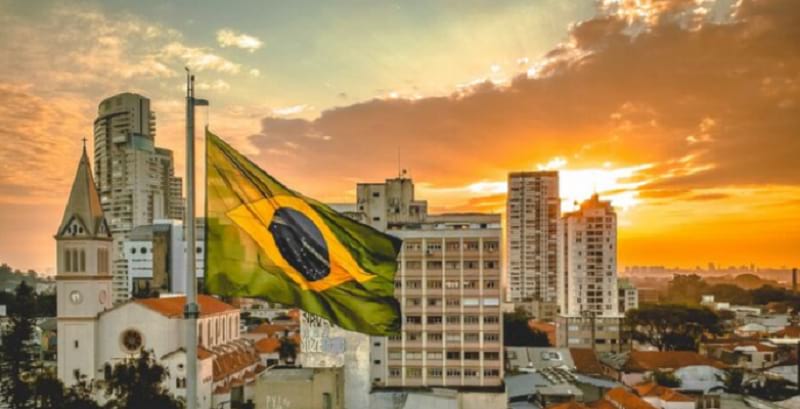
Among emerging markets, Brazil is becoming one of the world’s most sought-after destinations for foreign investors.
Why?
Brazil boasts a relatively safe and robust financial system, a relatively strong economy, an expanding renewable energy matrix, a red-hot real estate market, is cleaning up its act politically, is a global leader in agricultural exports, and is the world’s sixth-largest recipient of Foreign Direct Investment
Moreover, while Brazil, like most emerging markets, is still somewhat commodity-dependent, as it develops more inward-focused industries, including a burgeoning tech sector, it becomes more and more self-sufficient.
Below, we’ll expand on these important differentiators, and see how they contribute to Brazil’s viability as a foreign investment destination.
After that, we’ll take you through seven lucrative Brazilian investment sectors, providing tips on how to succeed in each one.
And finally, we’ll detail some of the risks of investing in Brazil as a foreigner.
By the end of this article, you will have a better understanding of why and how you should invest in Brazil.
And with Authentic Real Estate Team, you’ll have a team of native-Brazilian investment specialists to help you do it.
Let’s get started!
1. Its financial system is one of the safest and most robust in emerging markets
Among emerging markets, Brazil boasts one of the safest and most robust financial systems in the world.
Brazil’s large and diverse financial system is mostly dominated by investment funds and banks.
Both of which comprise multiple sub-sectors.
These sectors and sub-sectors work in concert to buoy Brazil’s economy and help it weather volatility in the global economy, as demonstrated in 2015 and 2016.
Despite a deep recession during this two-year period, the banking sector remained well-capitalized, liquid, and generally profitable thanks to strict lending regulations, and high fees and interest margins.
Likewise, the non-bank financial sector remained resilient.
Investment-funded assets grew steadily and there were improvements across many other key metrics.
This was thanks primarily to fixed income funds and high returns driven by high interest rates.
In short, Brazil’s robust, diverse financial system is built for growth.
And it’s designed to withstand the unpredictable nature of the globalizing economy.
Thus, as the pandemic begins to flatten out, Brazil’s investment markets should be well positioned to recover quickly and fully.
2. It is the main economy of Latin America
Brazil boasts the largest economy in Latin America, and the seventh largest in the world.
But it wasn’t always so prosperous.
The country’s GDP has grown considerably in the past few decades.
It’s been bolstered by factors such as the service industry, exports, and foreign investments.
And while Brazil’s economy, like many other economies around the world, took a hit during the COVID-19 pandemic, it has since bounced back, aided by booming trade, growing credit in the private sector, and one of the biggest stimulus packages among the world’s emerging markets, with nearly 4% GDP in emergency funding.
Another reason for the Brazilian economy’s growth, as well as its continued strength through the pandemic, is its sheer diversity.
With its highly diverse array of sectors, including agriculture, machinery, tourism and hospitality, the service industry, real estate, renewable energy, fossil fuels, and more, Brazil has been able to mitigate against economic foundering by keeping itself buoyed to as many industries as possible.
And just as this diversity has helped to raise Brazil’s economic tide and keep it afloat through the pandemic, it also makes Brazil a safe and stable place to invest.
Diversity is an important investment strategy, making it possible to take some losses without sinking your whole portfolio.
And the same principle applies when it comes to investing in a diversified economy.
Even if you choose to invest in only one of Brazil’s many sector’s, its overall economic diversity works to lift, and buoy, all boats.
3. It has one of the largest domestic markets on the planet
A large domestic market is a sign of a healthy economy.
And by this index, Brazil’s economy is looking stronger than ever.
With its combination of waning commodity dependence and economic diversity, and as home to the 5th-largest population in the world, Brazil has grown one of the largest domestic markets on the planet.
In recent years, the country has begun to add many more inward-focused industries, such as tech and fintech startups, to its diverse economy.
And because Brazil produces more than it imports, it has been able to supply its inward-focused business autonomously, creating a positive feedback loop of B2B relationships.
The strength of Brazil’s domestic market means the country doesn’t have to rely heavily on international trade.
Thus, it’s a safe place to invest in spite of any volatility in the global market.
4. Brazil is one of the largest producers and exporters of agricultural products
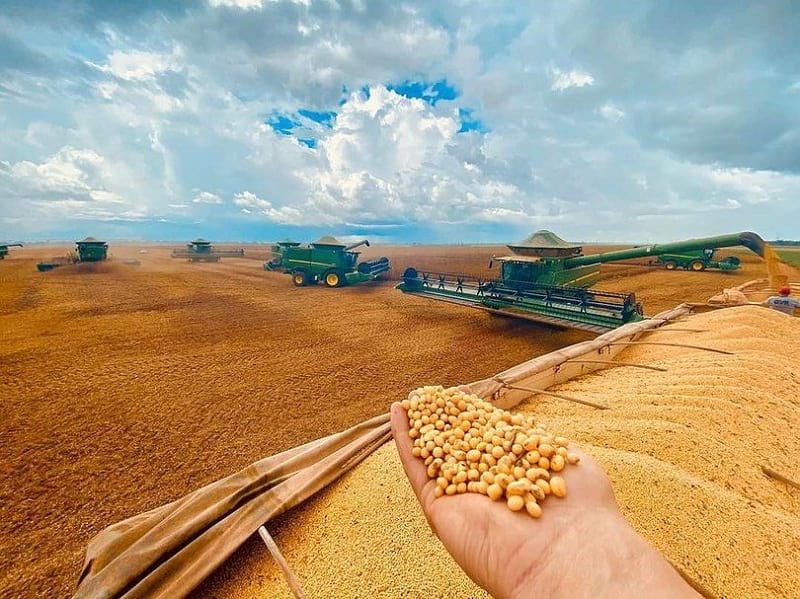
Brazil is more or less self-sufficient in terms of basic foods.
It’s also one of the world’s largest exporters of agricultural products.
And it’s easy to see why.
With rich soil, and abundant sunshine and rain, Brazil boasts the world’s richest flora (nearly 41,000 plant species).
And its these favorable growing conditions that make it ideal for industrial-scale farming.
Some of the major crops in Brazil include:
- Coffee – Brazil is the world’s number-one source of coffee, contributing around 25% of the world’s supply of this cherished bean
- Soybeans – In terms of value, soybeans are Brazil’s most important crop, accounting for almost 35% of the country’s agricultural output
- Sugar Cane – Brazil exports more sugar cane than any other country in the world, supplying the global market with 50% of its sugar
- Corn – After soybeans, corn is Brazil’s second-largest crop, with the country exporting more than 80 million metric tons a year, or 22% of the world’s supply
Of course, Brazil’s agricultural output isn’t all plant-based.
The country also supplies much of the world’s meat and other animal-based products.
Animal agriculture in Brazil consists of:
- Cattle – Brazil is home to the world’s second-largest population of cattle, at an estimated 232 million head. It is the world’s number-one producer of beef, exporting 23% of the planet’s supply
- Chicken – After the United States, Brazil is the world’s second-largest producer of chicken, producing 14.35 million tons a year
- Pork – Brazil is the world’s fourth-largest producer and exporter of pork, with 37.35 million head of pig in the country
5. It is the eleventh largest recipient of Foreign Direct Investment in the world
We could talk up Brazil as a lucrative place to invest all day.
But you don’t just have to take our word for it.
As it stands today, Brazil is the eleventh largest recipient of Foreign Direct Investment (FDI) in the world.
Companies and investors from around the world are waking up to Brazil’s unique investment viability, seeing opportunities in the country’s relative political and economic stability, its rising middle class, and its diverse array of markets, especially markets like agriculture, energy, mining, and others centered on natural resources.
And while the COVID-19 pandemic caused a significant slump in FDI starting in 2020, and while figures are still below pre-pandemic levels, between 2020 and the writing of this article, FDI doubled to $58 billion.
As Brazil continues in its post-COVID recovery, FDI is expected to keep trending upward.
So, what does it all mean for you?
If you want to know where in the world to invest, follow the money.
And if you’re following the money, it will lead you to Brazil!
6. Its real estate market is one of the hottest and most dynamic among developing economies
Another reason foreigners are flocking to invest in Brazil is the real estate market.
Brazil boasts one of the hottest, most dynamic real estate markets among developing economies.
From historically low interest rates to historically high demand, to a highly favorable currency exchange rate offering more bang for your homebuying buck, the 2020’s are proving to be the decade to invest in Brazilian real estate.
Learn more about why you should invest in Brazil’s hot real estate market below!
– Historically low interest rates
One of the best reasons for foreigners to invest in Brazilian real estate in the 2020’s is historically low interest rates.
Like in other countries around the world, Brazil’s central bank, the Banco Central do Brazil, has slashed interest rates to help stimulate the economy during the pandemic.
Thus, getting a mortgage in Brazil has never been cheaper.
This has led to a frenzy of interest from foreign investors looking to buy investment property in Brazil.
In fact, interest rates are so enticing, and potential relative returns so high, many investors are opting out of fixed-rate bonds and opting into the real estate sector.
Of course, as demand for investment real estate grows, so too do home prices.
Therefore, if you’ve been considering investing in Brazilian real estate, the time for consideration is over.
Contact Authentic Real Estate Team to learn how you can take advantage of historically low interest rates and invest in Brazil’s hot international real estate market!
– Higher ROI
With interest rates at all-time lows, and thus, demand on the rise, Brazilian real estate promises high returns and rapid appreciation for landlords and home flippers alike.
But don’t just take our word for it.
In the Brazilian stock exchange, the property sector has become one of the most promising options.
In fact, in 2020 alone, IPO’s from Brazilian developers totaled R$5.2 billion dollars.
But you don’t have to invest in public real estate options to take advantage of Brazil’s real estate market’s high ROI potential.
For property investors, the average ROI is upwards of 15-plus percent.
Want to earn even more?
Count on Authentic Real Estate Team for the expertise you need to maximize your ROI!
– Currency exchange rate
Another reason Brazil’s investment real estate market is flooding with foreign investors is the currency exchange rate.
Over the last couple of decades, the Brazilian Real has devalued considerably.
In 2005, for example, the exchange rate between Brazil and the United States was approximately two Reals to one US Dollar.
Today, it’s around five to one.
And it’s not just the United States enjoying more buying power in Brazil.
In fact, in a recent survey by Numbeo of 500 cities around the world, the major Brazilian cities of Rio de Janeiro and Sao Paulo were ranked as two of the most affordable locations to buy property.
For example, in Hong Kong, which ranked the most expensive city, one square meter of land cost US $32,000.
By contrast, in Sao Paulo, one square meter cost approximately $2,084.00.
In Rio de Janeiro, the average was just $1,778.00.
But the Real won’t stay devalued forever.
Thus, foreign investors stand to gain from double profit potential: the rebounding of the Brazilian Real relative to the US Dollar, and the appreciation of the property’s value over time.
– Built-up demand
While the outbreak of the COVID-19 pandemic initially caused uncertainty about the future, which in turn caused demand for real estate to slump, in the years since the first cases were discovered, demand has rebounded and is now reaching all-time highs.
Why?
Simple human nature: locked down for too long, and facing too few job prospects, people are looking for new homes in areas with better opportunities.
This has been especially true in Brazil, where today, property sales are driving the economy.
Developers across the country have been reporting strong sales figures.
Especially third-quarter sales, with some developments selling out within 24 hours of listing.
And the demand is showing no signs of slowing.
Based on the trajectory thus far, experts forecast growing demand through the 2020’s.
Thus, investors who buy now can expect rising rental rates and resale value for years to come.
– Demand for seasonal vacation homes
Hard times can be a big driver of indulgent behaviors.
When it comes to hard times, it’s difficult to imagine a harder time in recent history than the pandemic.
And when it comes to indulgent behaviors, it’s hard to think of one more indulgent than buying your own seasonal vacation home.
Thus, just as the pandemic has been driving people to seek residential homes in search of better opportunities, it’s been causing an uptick in sales of second homes.
In Brazil, this has been especially true.
Brazil is a popular place to vacation for tourists from around the world.
But today, with the COVID-19 pandemic giving the world pause as to what makes a good life, many are asking themselves why they should just visit when they can go on extended vacation for half the year.
With a second home in Brazil, investors can have a home away from home in one of the most naturally beautiful countries in the world, while reaping appreciation, and thus profits, down the road when they resell.
Do you want to invest in a second home in Brazil?
As a native-Brazilian company, Authentic Real Estate Team has the reach and resources to help you find the second home of your dreams!
– High demand for higher quality homes
The pandemic has caused billions of people around the world to take a step back and reexamine their lives, to reconsider what’s really important.
And for most people, what’s important is enjoying the finer things in life.
Thus, demand for high-quality homes is on the rise in Brazil.
Homebuyers are looking for homes with more floor space, bigger lots, luxury materials, high-end finishes, integrated living spaces for easy entertaining, and spacious bedrooms for ultimate privacy.
And experts expect demand for these types of higher-quality homes to continue well into the 2020’s.
With the favorable exchange rate between the Real and the US Dollar, there’s never been a better time to invest in luxury real estate in Brazil.
Count on Authentic Real Estate Team to help you find the best home for your needs!
7. It has an energy matrix based on renewable sources and in full expansion
Want to invest in one of Brazil’s strongest sectors while investing in the future of the planet?
Brazil’s renewable energy grid is helping to save the world, and helping foreign investors from around the world earn a great ROI.
Did you know Brazil is a world leader in the use of renewable energy?
In fact, renewables account for a whopping 50% of Brazil’s total energy matrix, compared to a mere 14% average for the rest of the world.
By 2026, Brazil plans to source 79% of its energy from renewables.
The main sources of renewable energy in Brazil are hydro-, wind-, and solar power.
Each one offers high profit potential and its own unique set of advantages.
But you don’t have to invest in renewable energy to benefit from it.
Because holistically speaking, Brazil’s pioneering use of renewables makes all of its sectors safer for investing, as it makes the country as a whole more energy-self-sufficient, and less vulnerable to fluctuations in the price and availability of fossil fuels.
But whether you want to invest directly in Brazil’s renewable-energy infrastructure, in Brazilian energy stocks, or in any other investment sector, count on Authentic Real Estate Team to help you make the best foreign investment for your goals.
Investment Guide To Brazil In 2022: Best Way To Invest In Brazil
Brazil’s large and diverse foreign investment market is uniquely suited for both long-term growth and stability against the vagaries of the globalized market.
And with its multitude of sectors, you can make the investment that best reflects your needs and goals.
Of course, with so much diversity, and so many options, it can be easy to fall victim to information overload.
And that’s where we come in.
As your Brazilian-investment experts in the United States, Authentic Real Estate Team will take you step by step through Brazil’s many foreign investment markets, providing valuable insight into each one, and helpful tips you need to succeed.
Read on to learn about seven of Brazil’s best foreign investment sectors, and see how you can earn a great ROI in this world-class emerging market.
Investing In Brazilian Bonds
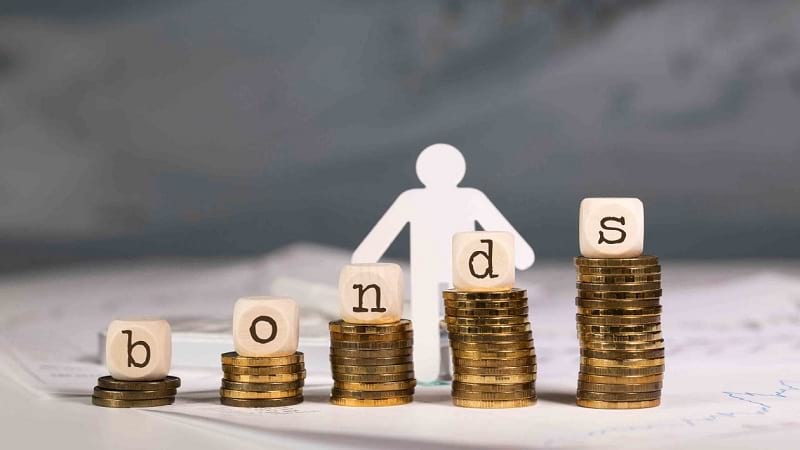
Are you looking for an investment with a predictable income stream?
Then investing in Brazilian bonds could be a good option for you.
But first, let’s make sure we’re on the same page with our terminology.
So, what is a bond, exactly?
To put it simply, a bond is a loan you make to the government or a company.
The government institution or company uses the loan to fund its operations.
And in return, it pays you (the investor) interest on the loan.
Interest is typically paid twice a year.
If a bond is held to maturity (the time by which the borrower must repay the full amount, or principal, to the investor), you can recoup your full investment plus interest.
Thus, bonds offer a secure, stable way to invest, letting you preserve capital while you do so.
Brazil issues many types of bonds, from both government institutions and companies alike.
Thus, like stocks, bonds give you freedom to put your money where you feel most comfortable.
All of Brazil’s government bonds, and many of its corporate bonds, are held in US Dollars.
This mitigates against the currency risk of the volatile Real.
However, there are certain other risks you should be aware of.
Learn about a few of the pros and cons of investing in bonds below:
Pros of investing in Brazilian bonds
1. Bonds offer fixed returns
– While bonds offer lower yields than other types of investments, they offer fixed returns whose predictability can be extremely valuable in its own right. Bonds typically pay out in interest twice a year, or at least annually. Moreover, they offer the chance to recoup 100% of your investment once they reach maturity.
2. Bonds are less risky than other investments
– Since a bond is a loan, the issuer of the bond has a legal obligation to repay the loan amount and interest. Thus, even if the corporation or government entity to whom you make the loan were to go bankrupt, they would still be legally entitled to pay you back. Contrast this with stockholders, who are basically out of luck if the company or municipality goes belly up.
3. Bonds are better than banks
– While the returns on bonds are lower than they are on stocks, they are higher than the returns on bank-held savings or checking accounts. Banks pay negligible interest. And when you add in inflation (economists predict post-COVID inflation of 2.4%), you could actually be losing money. By contrast, the average 10-year Brazilian government bond pays 11.65% interest.
4. Bonds are rated for risk by third-party agencies
– Unlike stocks, bonds are rated for risk. Third-party risk agencies rate bonds based on their quality and creditworthiness. Thus, bond investors can see exactly how much risk they’re taking on before they invest. Bonds with a higher risk rating, sometimes referred to as junk bonds, will usually promise higher interest to compensate.
Cons of investing in Brazilian bonds
1. Bonds offer lower yields than stocks
– While bonds are less risky than stocks, they typically offer lower yields. But for some investors, the stability of bonds is its own kind of value. Can’t decide between bonds and stocks? Then you may want to consider diversifying and investing in both.
2. Bonds require higher investment sum
– Bonds are often used to fund large-scale projects. Thus, the cost of a bond can easily reach five or six figures. This takes bonds off the table for some investors, who could otherwise invest in a fractional share of a stock with as little as one dollar.
3. Bond defaults can and do happen
– When a company or municipality issues a bond, it is legally obligated to pay back the bond in full plus interest. But that doesn’t necessarily mean it will. If the corporation’s or government’s financial situation becomes too degraded, it may default on its loans and bonds, leaving you out thousands of dollars. Thus, it’s essential that you research the entity from whom you’re purchasing your bond.
4. Interest rate changes
– And of the biggest risks of investing in bonds is interest rate changes. If you purchase a bond at a fixed interest rate, and the interest rate goes up immediately after, you’ll be stuck with sub-optimal returns for the life of your investment. To mitigate this, it is recommended that you buy bonds of varying maturity lengths to spread out the risk.
As you can see, there are many factors to consider before investing in Brazilian bonds.
And it’s essential that you weigh the relative risks and rewards.
Not to mention, both government and corporate bonds can be tricky to obtain for non-institutional investors.
However, with Authentic Real Estate Team, you’ll have expert guidance in deciding whether or not to invest in a Brazilian bond.
Moreover, you’ll have the reach and resources to help you easily obtain one should you decide it’s the right decision.
We can help you determine which bond(s) is best for your investment needs and goals, evaluating it in terms of its risk rating, interest rate, maturity period, and call provisions.
We can also help you find valuable information and forms about the company or municipality in which you want to invest, help you to navigate the complexities of currency exchange, and assist in obtaining certificates should you not want to hold the bond in your account.
Investing in Brazil’s Stock Market
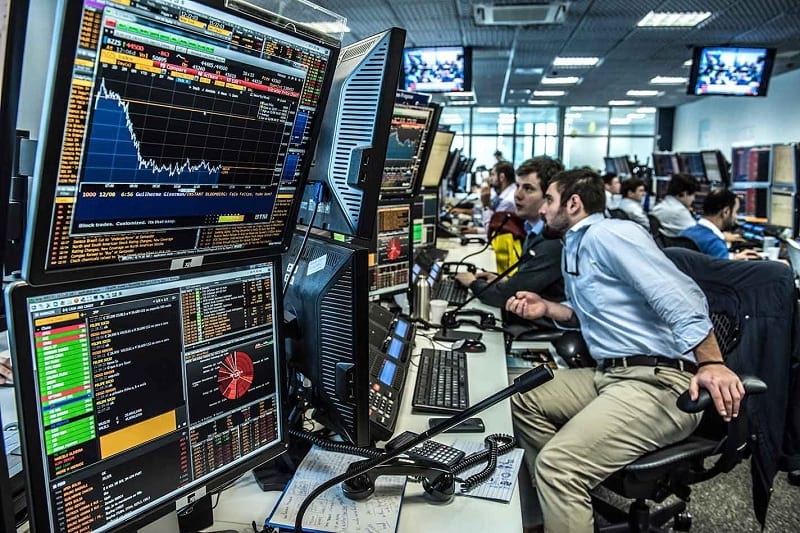
Looking for a more exciting way to invest than a fixed-income bond?
Then investing in the Brazilian stock market might be a good strategy for you.
Brazil boasts one of the strongest and most diverse stock markets in Latin America.
And with several huge IPO’s hitting the market recently, it’s growing stronger and more diverse all the time.
But why not just invest in American stocks, you ask?
Because, while the American economy is no doubt one of the most robust in the world, its size can work against stockholders.
In short, America’s economy simply can’t grow as fast as emerging markets without triggering inflation.
Meanwhile, Brazil’s emerging economy has plenty of room to grow, and plenty of room to grow your ROI.
Moreover, investing abroad is a great way to diversify your portfolio.
While all stock markets are interconnected to a degree, the factors that influence one stock market – eg investor perception, the political climate, interest rates, etc – aren’t necessarily the same factors that affect another.
Thus, if your American stocks take a hit, your Brazilian stocks may work to buoy your overall portfolio, and vice versa.
Want to make your move and invest in Brazil’s fast-growing, fast-diversifying stock market?
Authentic Real Estate Team can help!
But first, you should have a thorough understanding of what you’re getting into.
Below you’ll find some of the pros and cons of investing in the Brazilian stock exchange:
Pros of investing in Brazilian stocks
1. Valuations
– America’s bull market causes many companies to be overvalued compared to Brazilian companies. That means, on average, you’ll pay higher prices for smaller returns. For example, the overall price-to-earnings (P/E) ratio in the United States currently stands at 34.5. By contrast, in Brazil, the P/E ratio is just 6.99.
2. Growth
– As mentioned, the United States economy is a global juggernaut. But for stockholders, it can be a double-edged sword, as any rapid growth in the American market is likely to trigger inflation. In emerging markets like Brazil, by contrast, rapid growth means growth for your portfolio.
3. Diversification (geographic)
– Investing in Brazilian stocks is a way to mitigate against America-specific risks, such as inflation and geo-political conflict.
4. Diversification (sector)
– The American stock market centers heavily on tech and tech-adjacent companies. By investing in Brazil, you can invest in a wider variety of sectors.
Cons of investing in Brazilian stocks
1. Unpredictable growth
– In emerging markets like Brazil, growth can be unpredictable. For example, while Brazil often posts faster growth than the United States, it has been slower to rebound from the economic downturn caused by COVID-19.
2. Political instability
– Brazil is prone to political instability, with high levels of corruption in the government and a large, marginalized underclass eager for revolutionary change. This political instability can result in instability in the stock market.
3. Securities regulation
– With the Securities Act of 1933, America set the precedent that any publicly traded company must register with the SEC and make information about the company available to the public. However, not every country takes such a hard line when it comes to securities regulation.
4. High fees and commissions
– Trading costs are much higher for foreign stocks than domestic stocks. Thus, investors who buy into a fund could see higher fees. While investors who trade in stocks directly could see higher broker commissions.
If, after you’ve weighed the benefits and risks of investing in the Brazilian stock exchange, you feel that it’s the right move for you, here are some tips that can help you succeed!
Find the right ratio
– The majority of stockholders tend to invest in companies they know, a phenomenon known as home-market bias. And of those who choose to invest abroad, the average investor allocates just 22% of their stocks to foreign markets. However, experts suggest that in order to maximize your returns and minimize volatility, the optimal ratio is 40% foreign stocks to 60% domestic.
Decide whether you want to invest directly or in a mutual fund
– Generally speaking, there are two primary ways to invest overseas: directly, or through a mutual fund.
As a direct investor, you can either invest with a brokerage in your home country who is in contact with a brokerage in the foreign market, or you can invest directly with the foreign broker (although you should keep in mind that some foreign brokers will require you to maintain a minimum deposit).
With mutual funds, you can either invest in a foreign mutual fund, or in a domestic mutual fund which invests in foreign stocks. Mutual funds can be a good option for investors with a limited understanding of stock trading.
1. Open a bank account in Brazil
– One of the downsides of investing overseas is frequent currency conversion. Converting currency is complicated, and often involves costly foreign exchange transactions. In order to avoid this, you may find it helpful to open a bank account in Brazil.
2. Consider ADR’s
– Another way to avoid currency conversion is to invest in an ADR. ADR’s are American-traded securities that stand in for shares of foreign companies. Thus, they are denominated in Dollars rather than the foreign currency. Another perk of ADR’s is that they are sometimes available on stock trading apps like Robinhood. Stocks that trade directly on foreign exchanges generally are not.
For more information about investing in the Brazilian stock market, get in touch with the foreign-investment specialists at Authentic Real Estate Team!
Invest In Brazil – Real Estate

Want to get in on Brazil’s hot, diverse real estate market?
You’ve come to the right place!
As mentioned, the Brazilian market offers a wide range of incredible opportunities – such as in the second-home market and large-scale housing developments – and incentives – including a favorable exchange rate and historically low interest rates – for foreign real estate investors.
Looking at the Brazilian Savings and Loan System (SBPE), which finances medium- and high-standard residential housing, we can see 40.3% growth between 2020 and 2021.
And with the current favorable exchange rate, COVID-driven migration effect, and other influencing factors, experts expect to see continued growth in the residential real estate market, with high- and medium-standard housing projected to grow 14% in 2022.
As a US-based, native-Brazilian investment real estate company, Authentic Real Estate Team are uniquely qualified to help foreign investors buy and manage real estate in Brazil.
Here are a few of the Brazilian real estate investment opportunities Authentic can help you with:
1. Luxury residential real estate
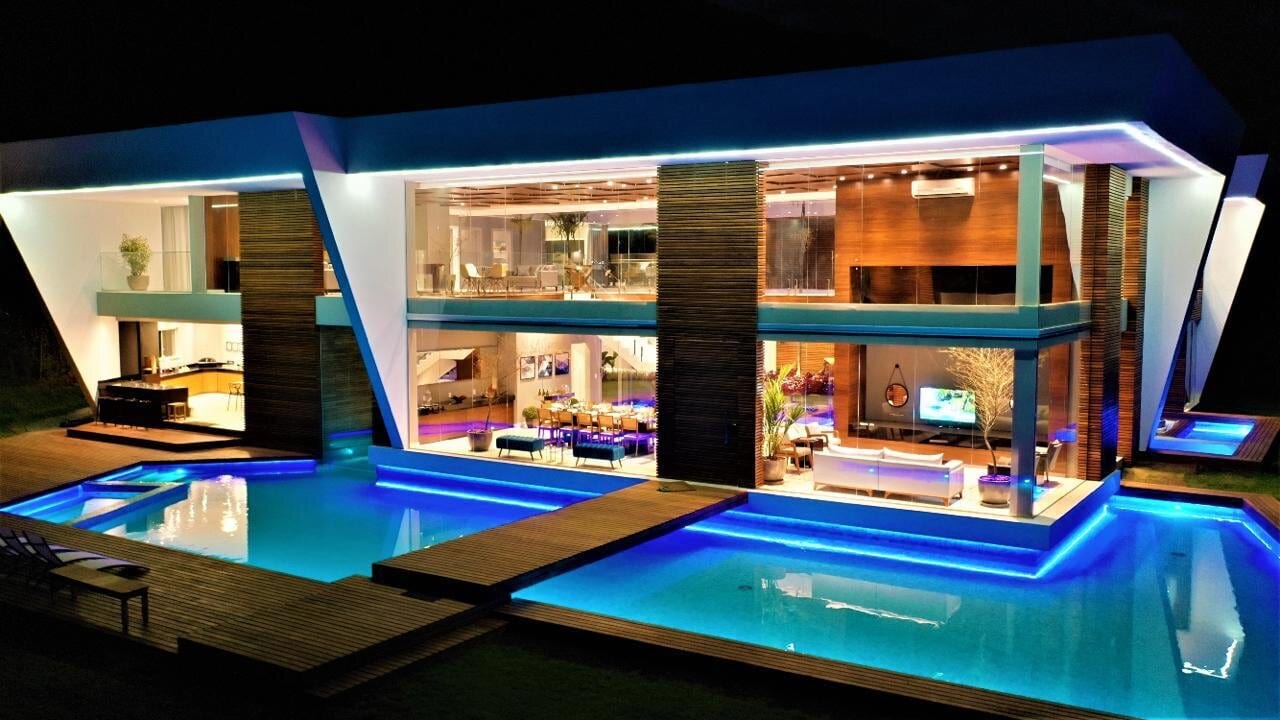
With the outbreak of the COVID-19 pandemic, homebuyers are reassessing what they want out of a home.
And Brazilians are no exception.
In Brazil, the luxury home market is experiencing historic growth, with buyers seeking larger floor plans, larger lots, integrated living spaces and gourmet kitchens ideal for entertaining, and spacious bedrooms with attached baths ideal for privacy.
And real estate experts forecast continued growth in the luxury real estate market through the coming years.
Thus, luxury real estate in Brazil represents a lucrative opportunity for real estate investors.
From long-term rentals to flip properties to buy-and-hold second homes, medium- and high-end Brazilian homes promise investors steady passive income, fast resale, and rapid appreciation.
2. Community real estate
Looking for a low-risk, high-reward real estate investment option in Brazil?
Then a community real estate investment property could be a great addition to your portfolio.
Community real estate is in high demand in Brazil.
As post-lockdown homebuyers search for higher-quality homes and a better quality of life, communities offer undeniable appeal.
With a community home, buyers can have the provenance of trusted builders, the peace of mind of new construction, the safety and privacy of a gated entry, and on-site amenities that maximize their fun and convenience.
And they’re willing to pay for it.
Thus, whether you’re in the market for a home to rent out or flip, Brazilian community real estate promises high average rates, quick resale time, and fast appreciation.
As Orlando, FL’s premier community home dealer, and with roots in Brazilian real estate, Authentic Real Estate Team has the experience, knowledge, and resources you need to invest in community real estate in Brazil.
3. Whole housing development
Of course, community real estate investors don’t have to limit themselves to one investment property at a time.
Are you a real estate developer?
Want to become one?
Brazil is primed for large-scale housing developments, and Authentic Real Estate Team can help you get your community up and running.
As mentioned, community real estate is in high demand in Brazil, with developers reporting strong sales, especially in the third quarter.
In fact, some developments are selling out within 24 hours of hitting the market.
And with Authentic Real Estate Team, you’ll have expert guidance in where to locate, and how to market, your development.
As part of the La Rosa Realty family of real estate companies, Authentic Real Estate Team has first-hand experience in developing residential communities, spearheading one of Orlando’s premier new developments, Paradiso Grande.
Count on our team to help you make your mark in Brazil’s community real estate market!
4. Apartment building
Another lucrative way to make a large-scale real estate investment in Brazil is to buy or build your own apartment building.
With rising prices and fierce competition in the luxury housing market, many Brazilians are choosing to buy and rent apartments instead of houses.
Like a housing community, an apartment building offers its residents optimum safety and convenience.
Luxury features can include guarded front desks, flexible locations, and in-building amenities.
And for developers, they offer unmatched investment security.
Owning an apartment building is a great way to hedge your risk, as for every problem tenant or unit, you’ll have many more to rely on.
Moreover, they’re less expensive than communities, as they cost less to develop, and aren’t taxed as heavily.
5. Second home
Another way people are enhancing their quality of life post-COVID is by investing in second homes.
A second home offers two types of returns: the memories you make every season, and the money you make when you resell the home.
Brazil is an ideal place to own a seasonal vacation home, letting you escape your winter blues in a tropical paradise of warm temperatures, endless outdoor recreation opportunities, and a unique culture complete with renowned cuisine, great music, and an electric nightlife.
And with steady growth in the housing market, you can rack up excellent appreciation while you rack up great memories.
6. Vacation rental
Brazil is one of the world’s premier vacation destinations.
And in a post-lockdown world, more and more people are turning to vacations as a way to decompress.
Moreover, every year, more and more people are turning to vacation rentals for their unbeatable luxury, privacy, fun, and value.
Want to get in on this growing trend with an investment vacation rental in Brazil?
Authentic Real estate Team can help!
As Orlando, FL’s vacation real estate specialists, Authentic Real Estate Team are expert in the buying and managing of vacation rentals.
And as a native-Brazilian company, we can help you find a great Brazilian short-term rental in a popular vacation location.
Furthermore, we can provide referrals to the country’s best real vacation-home management specialists.
With a Brazilian vacation rental, you can earn easy passive income week after week from tourists visiting Brazil.
Meanwhile, you can enjoy having a private vacation escape of your own to use whenever you want to visit.
Get in touch with Authentic Real Estate Team for more information about this exciting opportunity!
7. REIT’s
Of course, you don’t have to buy real estate to invest in Brazil’s hot real estate market.
REIT’s let you invest in companies that own and operate revenue-generating real estate – such as office buildings, warehouses, shopping centers, apartment buildings, hospitals, commercial forests, hotels, and more – without investing directly in the properties themselves.
Like stocks, REIT’s can be traded on major exchanges, offering an easy out when you want to exit the market, without having to find another buyer for the property.
Invest In Brazil – Infrastructure

Another exciting opportunity for foreigners who want to invest in Brazil lies in the infrastructure sector.
As part of Brazil’s efforts to recover from COVID, the Brazilian government has implemented a wealth of large infrastructure projects.
These infrastructure projects, such as the construction of airports, railways, roads, ports, and energy plants, are considered high priority.
Therefore, the government has taken unprecedented efforts to remove bureaucratic red tape and develop political instruments to foster infrastructure growth.
1. Infrastructure concessions
Among these instruments are PPP (private-public-partnerships), PAC (programa de aceleração do crescimento, or growth acceleration program), and projeto crescer (growing program).
The PPP (private-public-partnerships) is especially exciting for investors.
These instruments offer foreign companies the chance to bid on large infrastructure projects normally delegated to the public sector.
In fact, in 2022, Brazil plans to auction off 126 private concessions.
This is the most extensive portfolio of auctions and concessions in the world today.
These projects, involving the construction on ports, airports, roadways, sanitation, national parks, and more, are sure to attract loads of international investors, and are expected to bring 67-billion dollars in direct investment, and 218.7-million jobs, to the country.
Moreover, the public and private partnerships allow you the chance to invest in either private bonds and stocks or public bonds and securities.
As well as these opportunities, the government is offering special incentives in hopes of attracting more investors.
These incentives include tax breaks as well as security against any fluctuations in the exchange rate.
Brazil still has a lot of ground to make up before it reaches its infrastructure goals.
To date, average investment in infrastructure totals 2.1% of GDP, while the ideal rate is considered to be around 4.7% of GDP.
Thus, there are plenty of infrastructure investment opportunities – including in the private, public, and private-public-partnership sectors – to go around.
Scroll below to learn about some of Brazil’s exciting infrastructure projects, and see how you can leverage these projects to diversify your portfolio and earn great returns!
Federal government infrastructure investments
- The North-South Railway, connecting Itaqui in Maranhão to Anápolis in Goias, as well as an extension further south to Estrela d´Oeste in São Paulo
- Cuiaba’s Northern Railway (Ferronorte), which is part of the Transnordestin Raily
- A portion of the Railway FIOL connecting Varreiras and Ilhéus
- Expansion of the Carajás Railway, which bridges the Rio São Francisco
- Part of Highway Agreste, located in Pernambuco, and the final stretch of the Pajeú Highway, also located in Pernambuco
- Completion of the Sertão Canal
- Finishing the Cuiabá-Santarém Highway and adding access to the Port of Miritituba
- Multiple new highways as well as renovations of extant ones
- 2,000 new CEF (Caixa Economica Federal) agencies
- 5,000 investments in health and education infrastructure
- 5 million new shelters and residences
- “Agua e Luz para Todos,” or “Water and Light for Everyone,” a project to create 400,000 new water and power hookups
2. State and municipal government construction projects
- Multiple subway stations in Sampa
- Hundreds of new hospitals and clinics
- Thousands of miles of sewers and water conveyance
- New schools as well as renovations to extant schools
- Hundreds of sanitation embankments
- New waste disposal and recycling stations
3. Petroleum and gas
- Installation of the pre-salt petroleum exploration at Campo de Libra
- Construction of multiple new platforms and installation of large new marine oil fields in Sergipe, Rio Grande do Norte, Pará, São Paulo, as well as terrestrial oil fields inland in Paraíba and Ceará
- Installation of huge gas refineries in Maranhão and Minas Gerais
4. New ports and terminals
- Installation of large port in Açu, Rio de Janeiro
- Huge port in Itaguai, Rio de Janeiro
- TEGRAN terminal in Itaguai/ Maranhão
- Construction of new Coopersucar terminal in Santos, São Paulo
- Installation of no fewer than 30 TUP private-use terminals
- Construction of multiple rail stations and highway hubs accessing the ports
5. Mining
- Mining (iron ore) exploration begun in Barmin, Caitité-Bahia
- Start of mining by Vetria/ALL in Porteirinha-Minas Gerais
- Mining begun by AngloAmerican in Minas Gerais
6. Hydropower plants, solar plants, and wind farms
- Approximately 30 new hydropower plants and overhauls of existing ones
- Approximately 20 new windfarms in Rio Grande do Norte, Bahia, Ceará, Piauí, Rio Grande do Sul, and Santa Catarina
- New solar plants in Ceará and São Paulo
Invest In Brazil – Agribusiness
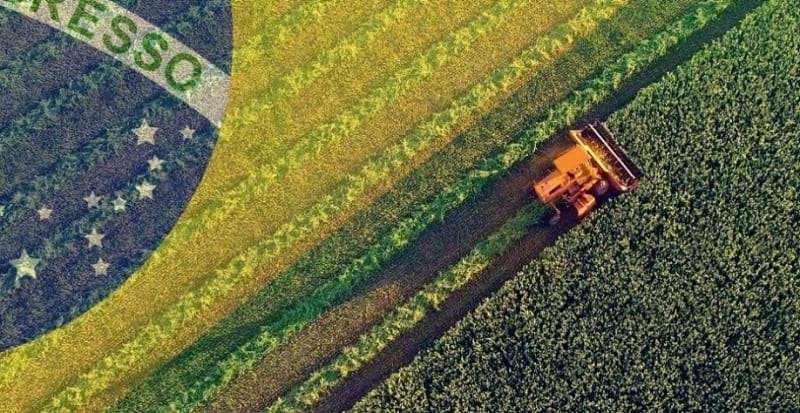
Did you know Brazil is on track to become the world’s leading exporter of agricultural products?
Brazil’s agribusiness makes up approximately 25 percent of the country’s GDP and 40 percent of its exports.
And it’s little surprise as to why.
Because with a diverse climate, fertile soil, abundant sunshine and rain, 12 percent of the world’s fresh water, and 388 million acres of farmable land, Brazil is ideal for vegetable, grain, animal farming, and more.
In fact, Brazil leads the planet in the production and export of sugar cane, coffee, tobacco, orange juice, and soybean oil.
It’s also the leading producer and exporter of beef, the world’s second largest producer of chicken, and fourth largest producer and supplier of pork.
Brazil’s reputation as an agricultural giant is nothing new, having long been considered the “Latin American breadbasket.”
And today, that reputation is only growing, as Brazilian agribusiness grows ever more modern, efficient, and competitive through the embrace of new science and technology.
In fact, many experts believe that Brazil could potentially triple its present production of grain without having to resort to deforestation.
Meanwhile, technological innovations in livestock farming could mean that 30 percent of the country’s pastureland could be re-appropriated for crops.
Also growing is Brazilian agriculture’s promise for amazing investment returns.
There are several ways to invest in Brazil’s agribusiness, including by investing in the companies that grow and raise the produce and livestock, as well as in the research institutions and technology and machinery companies that aid in these companies’ success.
Moreover, the Brazilian government, in partnership with the Ministry of Agriculture, Livestock and Supply, offers multiple incentives for investors who want to help fund Brazil’s agribusiness, including lines of credit and tax breaks.
Learn about ways you can invest in Brazilian agribusiness below!
1. Buy and farm your own land
Are you already in the agribusiness in the United States?
Setting up operations in Brazil could be good for your bottom line.
Not only is land generally more fertile in Brazil than in the United States.
Thanks to the favorable currency exchange rate, you can get land and labor for a great deal!
Buy land and lease it to another company
Of course, you don’t have to farm your land yourself to invest in Brazilian agribusiness.
With the low cost of agricultural land, you can also earn great returns by investing in farmland and leasing it to other companies.
2. Invest in agricultural stocks
Don’t want to get your hands dirty by investing in farmland directly?
Buying stock in the agribusiness sector is a less complicated approach with a high ROI potential.
With continued improvements in research and technology, Brazil is expected to be the world’s number-one agricultural exporter by the end of the decade.
Thus, whether you want to invest in stocks from farms, research institutions, or technology companies, Brazil’s agribusiness promises stockholders excellent returns for years to come.
3. Invest in government agribusiness bonds
Unsurprisingly, the Brazilian government has an interest in allocating resources to its growing agribusiness sector.
And one way they do this, in addition to taxation, is through the sale of bonds to foreign investors.
Buying government bonds is a safe and stable way to invest in Brazil’s agribusiness.
Unlike stocks, bonds pay a fixed income, with locked-in interest rates paid annually or semiannually.
Moreover, as a bond is a type of loan, the issuer is legally obliged to pay the bond back in full at the end of the maturity period.
That said, while bonds are safer than stocks, returns are typically lower.
Invest In Brazil – Oil Gas Market
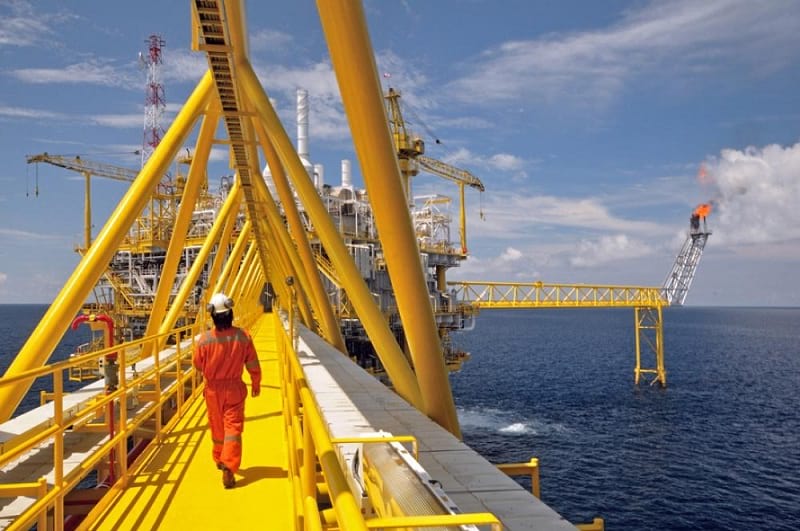
Did you know Brazil is one of the world’s leading suppliers of fossil fuels like petroleum oil and natural gas?
In fact, Brazil boasts 15% of the world’s proven oil reserves, supplying the planet with 1% of its total oil.
Meanwhile, in the last decade, natural gas production has more than doubled in Brazil, reaching more than 43.6 billion m³ in the year 2020.
And despite global efforts to move away from fossil fuels toward more sustainable sources of energy, Brazil’s reliance on its oil and gas reserves isn’t slowing down any time soon.
In fact, experts project significant growth in the fossil fuels sector, including in both petroleum and natural gas production, through the coming years.
And these aren’t just hypotheticals; the public and private sectors are joining forces to complete a number of projects in the near future.
Among these projects are the initiation of petroleum exploration, construction of a number of new drilling platforms, marine oil fields, and terrestrial oil fields, and the installation of enormous gas refineries, throughout the country.
Brazil’s government is making a number of concessions for these new projects.
Namely in allowing for private-public partnerships between energy companies and government factions.
Thus, as a foreign investor, you can choose how you want to invest: whether it’s the excitement and high-return potential of buying shares in an energy company, or the safety and stability of a fixed-income bond through the Brazilian government.
Invest In Brazil – Renewable Energy
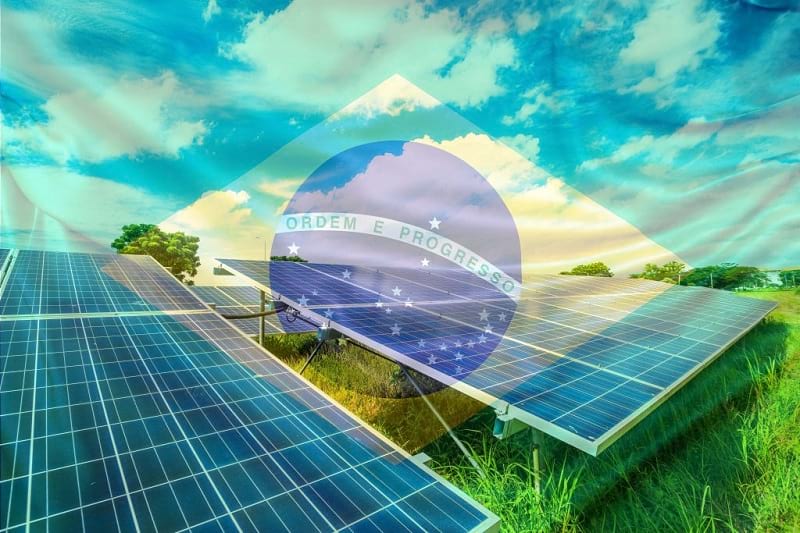
While Brazil is indeed a leading producer of fossil fuels like petroleum oil and natural gas, it’s also one of the world’s leaders in renewable energy.
With 12 percent of the world’s available fresh water, an equatorial location allowing for abundant sunshine, and dynamic weather producing frequent strong winds, Brazil is ideal for hydro-, solar-, and wind-generated energy capture.
Here are some interesting facts about the Brazilian renewable energy sector you might not know:
- Ethanol from sugarcane and hydroelectricity make up more than three quarters of Brazil’s energy usage
- Brazil is a world leader in the use of fully electric and hybrid vehicles
- The country is increasingly focused on biomass, as derived from the production of sugarcane ethanol
- Brazil projects huge growth in wind and solar energy
- Federal, state, and municipal governments have upped their budgets for renewable energy, while approving many incentives for direct investment by private investors and entities
- Tariffs on renewable energy will soon be reduced by 11%, which is expected to improve Brazil’s tariff ranking and make it more competitive in the global renewable energy market
- Renewable energy currently accounts for more than 85.4% of energy used domestically in Brazil
In addition to these exciting developments, the Brazilian government currently has plans for many new renewable energy projects in the works.
The future is green!
Some of these forthcoming projects include the construction and overhauling of around 30 hydropower plants, the building of around 20 new windfarms in Rio Grande do Norte, Santa Catarina, Bahia, Piauí, and Ceará, and brand-new solar plants in Ceará and São Paulo.
Moreover, last year at an American-sponsored climate summit, Brazil signed a pledge to reach zero net carbon emissions by the year 2050, a pledge that was reinforced a few months later at the 26th United Nations Conference on Climate Change.
This puts Brazil ten years ahead of its previous goal of reaching zero net emissions by 2060.
With all these recent developments in renewable energy, and so much planned growth, there’s never been a better time to invest in Brazil’s renewable energy sector.
And as with Brazil’s other investment sectors, with concessions in place for partnerships between public and private developers, you can invest your way!
But whether you want to invest in private stocks, government bonds, or set up shop in Brazil with your own renewable company, count on the investment experts at Authentic Real Estate Team for the guidance you need to invest with success.
Risks Of Investing In Brazil
As in all emerging markets, Brazil’s foreign investment market is a double-edged sword.
On one hand, emerging markets promise the chance for rapid growth without inflation.
On the other hand, as an emerging market, Brazil is subject social, governmental, and financial volatility.
And these increase the risk to foreign investors.
In fact, in some ways, Brazil is even riskier than other emerging markets.
Scroll below to learn about a few of the risks faced by foreigners investing in Brazil.
1. Political corruption
– political corruption runs rampant in Brazil, and can be traced all the way to the highest offices of the government. In a 2014 undercover investigation codenamed Operation Car Wash, it was discovered that state-run oil company, Petrobras, had been accepting bribes from companies in exchange for oil deals at highly inflated prices. In fact, Brazil’s own President Lula was found to have accepted a beachfront condo in exchange for helping a company secure an oil contract through Petrobras. This political corruption can have far-reaching impacts, including on Brazil’s many investment markets.
2. Currency volatility
– While the Real is currently devalued at a ratio of about 1 to 5 against the US Dollar, thus making it favorable to foreign investors in the United States, it isn’t guaranteed to stay that way. As in most emerging markets, Brazil’s currency is subject to volatility. That means its strength relative to other countries’ currencies may change unexpectedly. Thus, just because your investment dollar goes a long way in Brazil today, doesn’t mean it will tomorrow.
3. Currency conversion
– As is the case with any foreign investment, investing in Brazil can require frequent complicated and costly currency conversion. Not only can switching between the Dollar and the Real be annoying. It can also be expensive, as companies that provide currency conversion services usually charge fairly high fees. To mitigate against this, it might be helpful to open a bank account in Brazil.
4. Unpredictable growth
– While Brazil has seen impressive growth in the last couple of decades, as an emerging market, it’s not guaranteed to keep growing at the same rate. For instance, Brazil’s growth slowed considerably following the outbreak of COVID-19, and the economy has been much slower to recover than in the United States.
Commodity dependence
– Brazil is self-reliant when it comes to natural resources. However, like most emerging markets, it’s dependent on other countries for certain commodities. This dependence can not only affect the economy as a whole. It can permeate individual investment markets as well, resulting in rising costs and worse.
Lax regulations
– Brazil’s stock market isn’t as tightly regulated as in the United States. In America, any publicly traded company has to make all information about the company a matter of public record. This allows stock traders to research the company before they invest. Which in turn lets them see how the company and its stocks have performed in the past and how they are projected to perform in the future. In Brazil, however, while there are certain regulations in place, the market is not as strictly regulated as in the US. This makes it harder to make an informed investment.
Higher fees
– Stock trading usually comes with a variety of fees and commissions. But these costs are usually much higher for overseas investments than they are for domestic ones. So, whether you want to invest in a Brazilian mutual fund or in the stock market directly, you should be prepared to pay more in fees and commissions.
How Can a foreigner Invest in Brazil?

Do you want to invest in one of the fastest-growing, most dynamic, most diverse emerging markets on earth?
As one of the biggest producers and exporters of agricultural goods in the world, a leader in renewable energy, with a stable economic system and large and growing economy, and with a wealth of government-backed incentives in place, Brazil is primed for foreign-investment success.
And as a native-Brazilian, investment-specialized real estate brokerage, Authentic Real Estate Team can provide invaluable guidance through your Brazilian investment journey, as well as direct access to great investment opportunities.
For more information, or to start your investment journey today, contact Authentic Real Estate Team!


